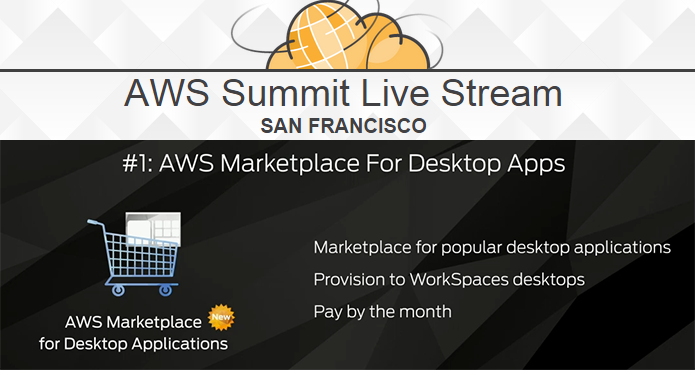 Cloud has become "the new normal" and you might as well embrace it instead of trying to fight gravity, said Andy Jassy, SVP at Amazon.com, speaking at the company's AWS Summit in San Francisco.
Cloud has become "the new normal" and you might as well embrace it instead of trying to fight gravity, said Andy Jassy, SVP at Amazon.com, speaking at the company's AWS Summit in San Francisco. To differentiate from other cloud providers, AWS is seeking "much deeper features" with it services, such as tight integration between its compute, relational databases and analytic offerings.
To differentiate from other cloud providers, AWS is seeking "much deeper features" with it services, such as tight integration between its compute, relational databases and analytic offerings.Some highlights:
- AWS reports 102% YOY growth in its S3 storage service, as measure by data transfers in/out of S3 -- big growth on a big base of cloud storage.
- AWS EC2 Container Service is now generally available. This is a highly scalable container management service that supports Docker containers, enabling users to run applications on a managed cluster of Amazon Elastic Compute Cloud (EC2) instances. AWS is also adding a new Amazon ECS Service scheduler to manage long-running applications and services. The Service scheduler maintains application availability by scaling containers up or down to meet an application’s capacity requirements.
- AWS announced an Elastic File System service that will run on low-latency SSDs, scale to hundreds of petabytes while being able to support 1,000s of concurrent accesses. It provides multiple EC2 instances with low-latency, shared access to a fully-managed file system via the popular NFSv4 protocol. The security is designed for large, complex organizations. Pricing starts at $0.30 per gigabyte per month.
- AWS Lambda is now in production. This is a zero-admin compute platform that does not require the user to configure, launch, or, monitor Amazon Elastic Compute Cloud (EC2) instances, to think about scale, or worry about fault tolerance. AWS Lambda functions are defined using JavaScript and then connected to other AWS resources. Applications can then run, and scale to high-volume as needed.
- AWS is enhancing its WorkSpaces virtual desktop (VDI) service by launching a Marketplace for Desktop Applications. This will give uses access to popular desktop apps for a monthly fee with no long-term contract. Over 100 popular apps will be available to virtual desktop users at launch. AWS is also launching a new WorkSpaces Application Manager (WAM) that provides on-demand access to centrally managed desktop applications. Delivery is secure, scalable, and streamlined; you can choose your applications from a catalog (built by your IT Manager) and start using them within seconds, with a user-based pricing model. Companies can use WAM to provide employees with access to a curated collection of commercial (licensed), open source, and in-house applications. Apps are deployed to Amazon WorkSpaces using application virtualization technology, which allows Amazon WAM to safely encapsulate and isolate applications in dedicated containers that run using resources provided by Amazon WorkSpaces. The application virtualization technology transforms Windows applications into centrally managed virtual applications. Apps are never installed, which streamlines application life-cycle management for IT admins.
- AWS is introducing Amazon Machine Learning service, which lets users build predictive models using large amounts of data from S3 or Redshift.

https://live.awsevents.com/




















